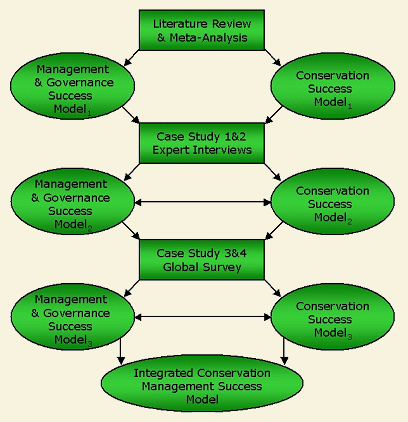|
General
Outline GoBi
Losses
in biodiversity are becoming alarming. To safeguard what is left
means placing priority on the protection of species and habitats.
Ideally, this should be a goal in its own right. In practice,
people need to see a direct gain. An innovative approach to
biodiversity management are Biosphere Reserves which comprise a
strategy to reconcile conservation with the sustainable use of
natural resources.
Biosphere reserves currently
about 440 sites in 97 countries (July 2003) are areas of
terrestrial and coastal/marine ecosystems that are
internationally recognised under UNESCO`s Man and Biosphere (MAB)
Programme. Biosphere reserves aim to be experimental places and
vanguards for sustainable development, as MAB has declared it in
the Seville Strategy (1995) and reinforced in the Seville +5
declaration (2000). This ambitious claim is difficult to realise
as many biosphere reserves neither have the capacity nor the
resources to meet this global mandate. The implementation of the
strategy thus still leaves room for improvement.
The
conservation success of biosphere reserves and other protected
areas is dependent on the appropriateness of their management
systems and broader governance issues such as their political and
legal system, resource-use patterns as well as the degree of
involvement of communities living within or nearby them. The
interdisciplinary research group GoBi will develop and test an
integrated set of indicators to find out and measure which
particular factors impact in what way on the management success
or failure of biosphere reserves.
|
|
|
To
address the current lack of studies on the effectiveness of
biosphere reserve management and governance approaches in
achieving the combined conservation and development objectives
our research group integrates different ecological and
socio-economic theoretical concepts and empirical methods in an
adaptive manner. The theoretical framework encompasses
conservation biology, social psychology and rural and development
sociology including research on common property governance.
The
integrated set of methods consists (see figure 1) of a
combination of quantitative and qualitative methodological
approaches including a comprehensive literature review, a
statistical meta-analysis and a survey (all with a global focus).
A couple of detailed case studies in biosphere reserves in
tropical and subtropical countries will be conducted as well as
in-depth interviews with experts from all over the world.
Ecological aspects such as the determination of the conservation
success of different biodiversity management and governance
approaches in biosphere reserves will be included into the
socio-economic work through database analyses and supporting
fieldwork.
The results of our empirical research will be
integrated in the light of our theoretical findings, leading to a
comprehensive analytical instrument identifying success and
failure factors of an effective biodiversity and biosphere
reserve management.
|


